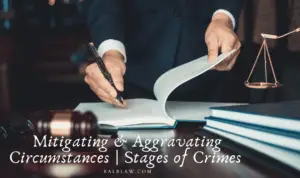Crimes committed on the occasion of calamity or misfortune show the perversity of the perpetrators. People are often already struggling to cope with the aftermath of a disaster, such as the loss of their homes, possessions, or loved ones, at times like these.
Such occurrences can further traumatize and distress the disaster’s victims. It can make them feel even more vulnerable and helpless, as well as undermine their sense of trust and security.
When a crime is committed as a result of a conflagration, shipwreck, earthquake, epidemic, or other calamity or misfortune, it is one of the circumstances that aggravate criminal liability under Article 14, paragraph 7 of the Revised Penal Code.
This means that an offender’s criminal liability is increased if he committed the punishable offense during a conflagration, shipwreck, earthquake, epidemic, or other calamity or misfortune because, instead of lending aid to the afflicted, he adds to their suffering by taking advantage of their misfortune to despoil them.
Crimes committed on the occasion of calamity or misfortune aggravates the unfortunate situations
People are already dealing with difficult and challenging circumstances during period of calamity or misfortune. Criminals perpetrating crimes in these moments can aggravate the situation, adding stress and danger to the affected community.
For instance, a fire may have already destroyed people’s homes and possessions, and the last thing they need is to be concerned about their safety from criminals exploiting the chaos. Similarly, people are already struggling to stay healthy during an epidemic, and criminals who spread false information or engage in hoarding or price gouging can exacerbate the situation.
Committing a crime during a time of calamity or misfortune is therefore considered an aggravating circumstance. It demonstrates a lack of empathy and concern for the well-being of others, and it can exacerbate an already difficult situation.
Why is this circumstance considered Aggravating under Criminal Law?
Several factors contribute to the aggravation of a crime committed as a result of a conflagration, shipwreck, earthquake, epidemic, or other calamity or misfortune, such as but not limited to:
Vulnerability Exploitation: Such disasters or misfortunes frequently leave people vulnerable and in need of assistance. Criminals who prey on people’s vulnerabilities during these times are seen as especially heartless and opportunistic.
Resource Diversion: During such events, resources and attention are diverted to rescue and recovery efforts. Crimes committed during these times can divert desperately needed resources away from these efforts, exacerbating the situation.
Order Disruption: Natural disasters and misfortunes can disrupt normal order and social structures, resulting in chaos and confusion. Crimes committed during these times can exacerbate the situation and cause even more harm.
Higher Stakes: The consequences of committing a crime during a disaster or misfortune may be more severe than usual. During an epidemic, for example, stealing food or medicine can have life-threatening consequences for those in need.
Crimes committed during natural disasters or misfortunes are viewed as particularly heinous since the actors prey on vulnerable people and stymie efforts to address the situation.
The Law | Crimes Committed on the Occasion of Calamity or Misfortune
Par. 7 – That the crime be committed on the occasion of a conflagration, shipwreck, earthquake, epidemic or other calamity or misfortune.1
Elements
- Crime was committed when there was conflagration, shipwreck, earthquake, epidemic or other calamity or misfortune.
- Offender took advantage of the state of confusion or chaotic condition from such situation or misfortune.
Other calamity or misfortune refers to conditions of distress similar to those already enumerated by the provision. Chaotic scenarios, after liberation from the misfortune, are not within the bounds of the provision.
If the offended party provoked the accused to commit the crime during calamity or misfortune, this will not constitute an aggravating circumstance because the accused did not take advantage of the condition or misfortune.
Relevant Jurisprudence
In U.S. vs. Rodriguez,2 the Court ruled that “The reason for the existence of this circumstance is found in the debased form of criminality met in one who, in the midst of a great calamity, instead of lending aid to the afflicted, adds to their suffering by taking advantage of their misfortune to despoil them.”3
In People vs. Arpa,4 the Court ruled that “The development of engine trouble at sea is a misfortune, but it does not come within the context of the phrase “other calamity or misfortune” as used in Article 14, paragraph 7 of the Revised Penal Code, which refer to other conditions of distress similar to those precedingly enumerated therein, namely, “configuration, shipwreck, earthquake, epidemic”, such as the chaotic conditions resulting from war or the liberation of the Philippines during the last World War. Clearly, no such condition of great calamity or misfortune existed when the motor banca developed engine trouble”.5
In People vs. Penjan,6 the Court held that chaotic condition is not necessarily a calamity or misfortune. Chaotic condition resulting from the liberation of San Pablo is considered a calamity.
In People vs. Lao Wan Sing,7 the Court held that the circumstance of “taking advantage of the confusion occasioned by another fire” was aggravating in arson.8
Summary
One of the situations that makes the criminal liability of the offender more severe is when the crime he committed occurred as a result of a conflagration, shipwreck, earthquake, epidemic, or other calamity or misfortune.
This is one of the situations that makes the criminal liability of the offender more severe because, rather than offering aid to the afflicted, he adds to their suffering by taking advantage of their misfortune to rob them.
Yet, it is not regarded an aggravating situation when the chaotic condition happens after the tragedy or misfortune has passed away. This is because it comes after the event that caused the chaos.
Conclusion
Whether the offender’s unlawful act, amounting to a crime, was committed during or on the occasion of conflagration, shipwreck, earthquake, pandemic, or any other tragedy or catastrophe, the offender’s criminal culpability has been aggravated because of the increased severity of the act.
Therefore, instead of helping those who are in need, the perpetrator makes their lives more more difficult by taking advantage of their plight in order to enrich himself at their expense.
This goes against the basic human decency of assisting those in distress at times of disaster. In these moments of disorientation and chaos, the offender reveals a dark intent to inflict pain and suffering on others, without a shred of humanity permeating his soul.




